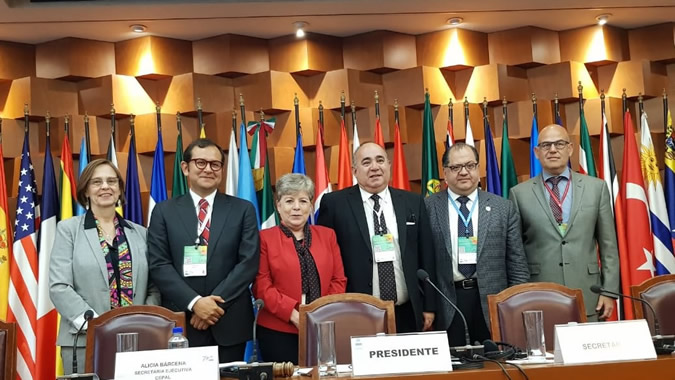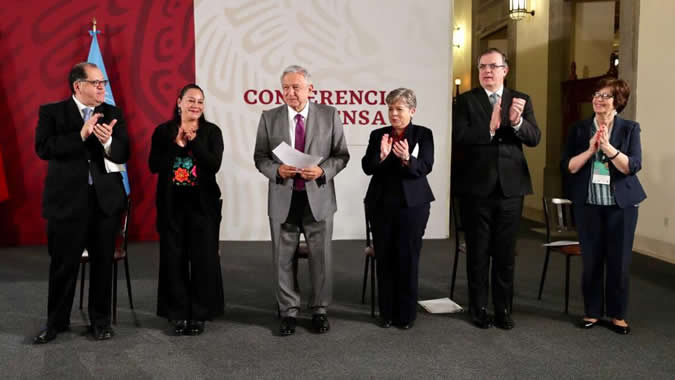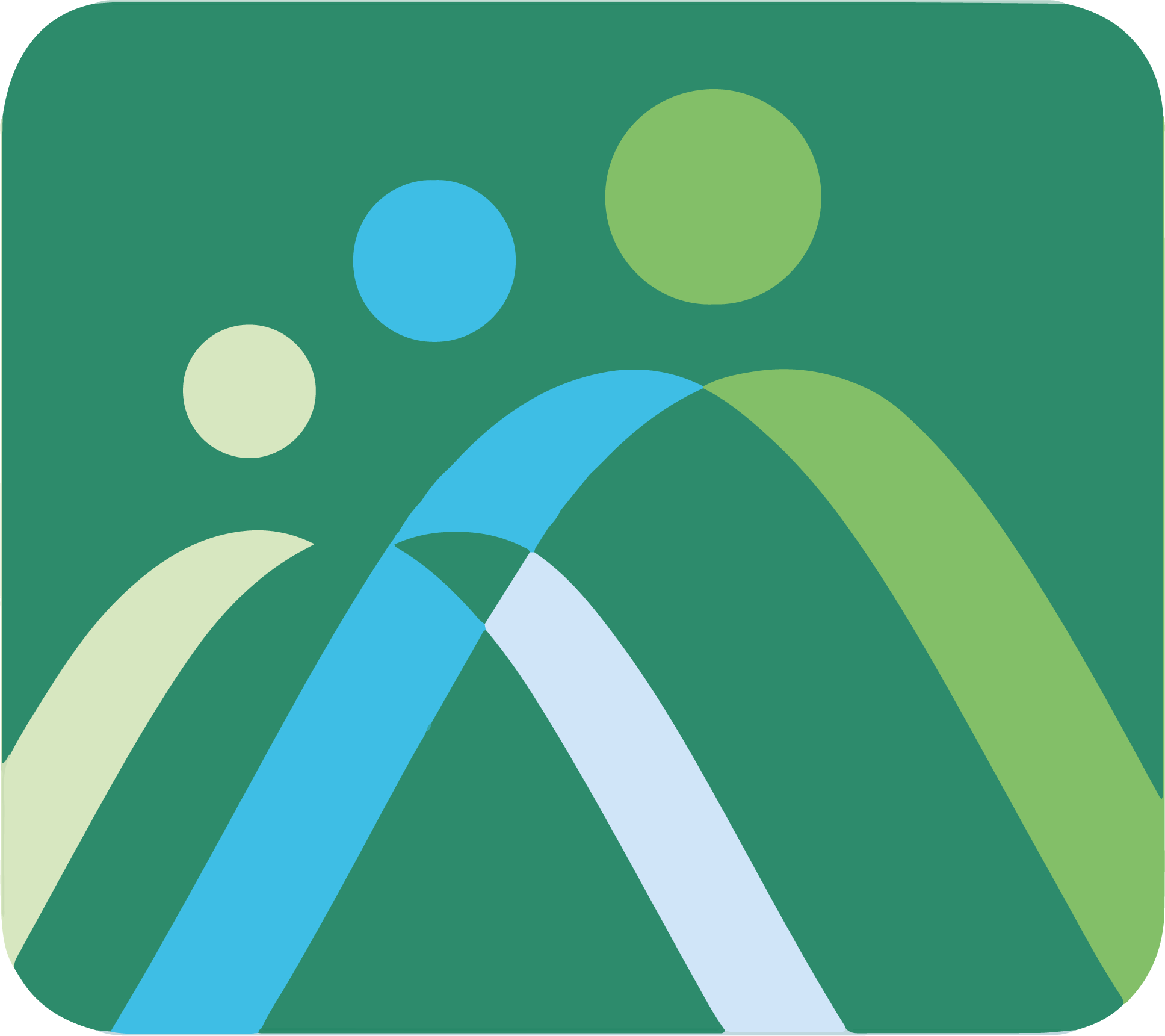Authorities from Latin America and the Caribbean Approved Regional Agenda to Promote Inclusive Social Development
Work area(s)
That is the primary outcome of the Third Meeting of the Regional Conference on Social Development in Latin America and the Caribbean, a gathering convened by ECLAC, the government of Mexico and the UNDP, which concluded this Thursday in the Mexican capital.

Mexico City, October 3, 2019. The authorities participating in the Third Meeting of the Regional Conference on Social Development in Latin America and the Caribbean approved today a regional agenda for inclusive social development, as a technical and political instrument that will enable moving towards implementation of the social dimension of the 2030 Agenda for Sustainable Development in Latin America and the Caribbean and will thereby contribute to eradicating poverty and achieving greater levels of equality and well-being in the region.
This Regional agenda for inclusive social development expresses the shared stance of countries regarding the need to promote a new generation of social policies anchored in a rights- and equality-based approach and guided by the principle of universalism that is sensitive to differences; to strengthen the social institutional framework, including countries’ capacity to invest in social matters; to provide sufficient, guaranteed resources for social policies; and to bolster multilateral action.
The axes of the agenda agreed upon by the delegates gathered in Mexico are: universal and comprehensive social protection systems; policies for social and labor inclusion; a strengthened social institutional framework; and regional cooperation and integration to advance towards inclusive social development and to achieve sustainable development.
At the Conference’s closing session, Alicia Bárcena, the Executive Secretary of the Economic Commission for Latin America and the Caribbean (ECLAC), stated that “Latin America and the Caribbean has to show the world that it has a deep commitment to social development by fighting against inequality, poverty and extreme poverty, despite the economic, political and social problems, obstacles and dilemmas that we are experiencing.”
Bárcena stressed that “we cannot let our guard down because the economy is imposing very severe restrictions on us. Social programs must continue to be a priority for the countries of our region.” She continued: “The message is very clear. Necessary and urgent progress on social development must not be seen as an obstacle to economic growth. Equality is a necessary condition for advancing growth. This is about equalizing to grow, and growing to equalize.” In her remarks, ECLAC’s most senior representative thanked Mexico, in particular the Foreign Affairs and Welfare Secretariats, for being “extraordinary hosts of this Conference.”
Meanwhile, Humberto Adán Peña Fuentes – on behalf of María Luisa Albores, Mexico’s Secretary of Welfare – said, “we are assuming the Chair of the Regional Conference on Social Development in Latin America and the Caribbean with the firm commitment and full determination that this space serve as a leader in the construction of social development and welfare policies throughout the Continent.”
“I applaud the authorities’ adoption of the Regional agenda for inclusive social development. We must recall that, beyond being a collective global aspiration, the success of the Sustainable Development Agenda, and its Sustainable Development Goals, will depend on officials taking ownership of it at a national and subnational level and on its influence on the processes for planning and implementing public policy. In the concrete case of Latin America and the Caribbean, contextualizing the 2030 Agenda requires understanding the greatest challenges and obstacles to development faced by a middle-income region, which, although it has achieved significant growth and poverty reduction, it has not been able to consolidate itself as a middle-class society, which limits its capacity to make that final leap towards development. And on this challenge, you have the support of the United Nations system’s agencies, funds and programs,” said Luis Felipe López-Calva, Regional Director for Latin America and the Caribbean of the United Nations Development Programme (UNDP).
At the regional gathering, country delegates analyzed ECLAC’s document Critical obstacles to inclusive social development in Latin America and the Caribbean: Background for a regional agenda, which identifies at least eight key factors impeding the achievement of inclusive social development in the region. These include the persistence of poverty, structural inequalities, the deficit of decent work and social protection, insufficient social investment, diverse forms of violence, and disasters and climate change.
In their resolution, the country representatives gathered in Mexico also highlighted ECLAC’s establishment of the Observatory on Social Development in Latin America and the Caribbean, “as a regional public good to support the design and implementation of public policies and monitor their trends.” The Observatory integrates a number of digital platforms, including portals and databases on social investment, non-contributory social protection programs, social institutional frameworks, youth and social inclusion, food and nutrition security, and regional and subregional commitments related to social development.
These representatives agreed that the Presiding Officers of the Regional Conference on Social Development will be made up of Mexico as Chair and Barbados, Costa Rica, Ecuador, Paraguay, Uruguay and the British Virgin Islands as Vice-Chairs. The Fourth Meeting of the Presiding Officers of the Regional Conference will take place in 2020.
Convened by ECLAC, the government of Mexico and the UNDP, the Third Meeting of the Regional Conference on Social Development in Latin America and the Caribbean took place in Mexico City in conjunction with the XI Ministerial Forum for Development in Latin America and the Caribbean, which was organized by the UNDP.
Participants included 102 representatives of 29 countries and 40 delegates from 13 United Nations agencies and international organizations. Representatives of 18 civil society institutions also attended along with members of academia and the private sector in Latin America and the Caribbean.
More information:
Press contacts:
Secretariat of Welfare of the Government of Mexico - Cihuatl Zuñiga, Social Communications Coordinator, cihuatl.zunigan@bienestar.gob.mx, +5544754237.
ECLAC – Guido Camú, Chief of the Public Information Unit, prensa@cepal.org, +56 2 2210 2040.
UNDP – Ana del Toro, ana.deltoro@undp.org, +52 1 5540912611 / Vanessa Hidalgo, vanessa.hidalgo@undp.org, +1 646 338 9462.
Related event
Related content

Nueva generación de políticas de bienestar es necesaria para acelerar implementación de la Agenda 2030, señalan autoridades en apertura de conferencia regional
The president of Mexico, Andrés Manuel López Obrador, led the inauguration of this event.
Subregional headquarter(s) and office(s)
Subregional Headquarters, MexicoRelated link(s)
Country(ies)
- Latin America and the Caribbean
- Mexico
Contact
Public Information Unit
- prensa@cepal.org
- (56 2) 2210 2040


